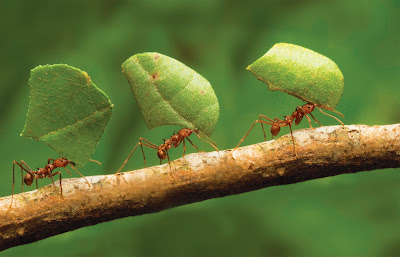After the age of the
dinosaurs came to an end some 65 million years ago, a ‘tribe’ of ants known to
scientists as the Attini decided to give up life as hunter-gatherers and become
farmers instead, according to a new genetic study.
It was an astonishing
move that humans only managed to accomplish some 10,000 years ago.
The ants, native to
South America, began farming fungus that grew on decomposing wood, setting
off an evolutionary revolution.
About 25 million year
ago, one group of fungus farmers began growing a particular fungi that produced
protein-rich bulbs that proved a highly nutritious food.
A paper about the
research, published in the journal Nature Communications, said that ants had
evolved “complex societies with industrial-scale farming”.
This allowed ant
colonies to increase in size until 15 million years ago when the leafcutter ant
emerged. They feed a fully domesticated species of fungus kept in vast
underground farms with fresh green leaves every day, supporting colonies number
millions of individual insects.
The researchers
sequenced the ants' entire genome to come up with their estimated date for
the transition from a hunter-gatherer lifestyle to farming among ants.
They said their date
of about 55 to 60 million years ago was earlier than previous estimates.
Curiously the move to
farming was not immediately beneficial in both ants and humans.
The farmer ants were
“metabolically less efficient” than ant species with traditional diets, a
situation that remained the same until the farmers improved their techniques.
“Similarly, early
human farmers of loosely domesticated crops had poorer health and smaller body
stature compared with … hunter–gatherers (of that time),” the researchers
wrote.
The final result was
a single, all-purpose superfood that was resistant to diseases, pests and
drought that the ants could produce on an industrial scale.

No comments:
Post a Comment